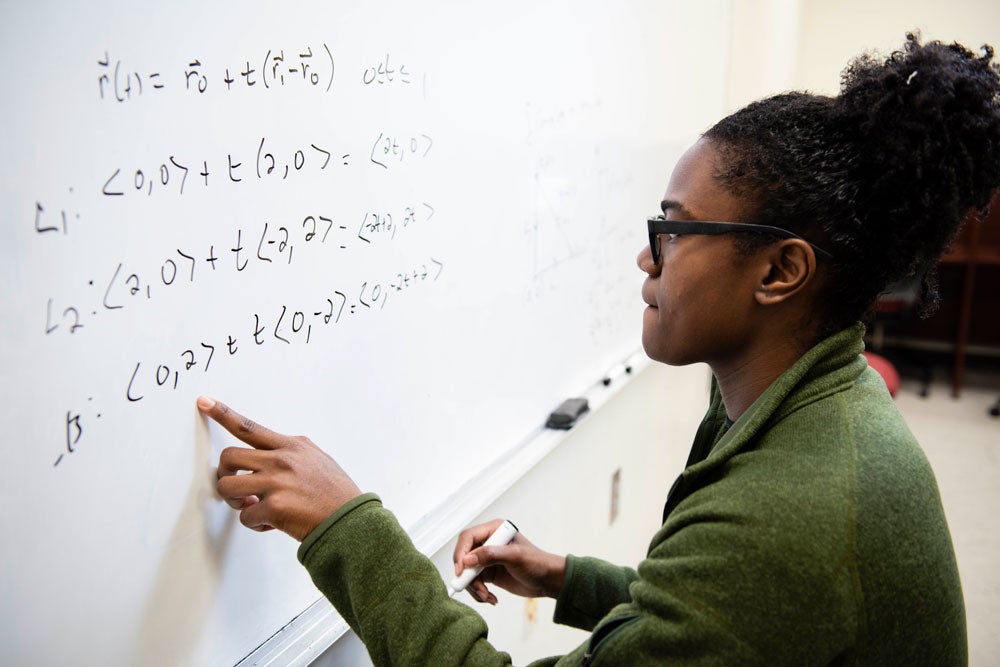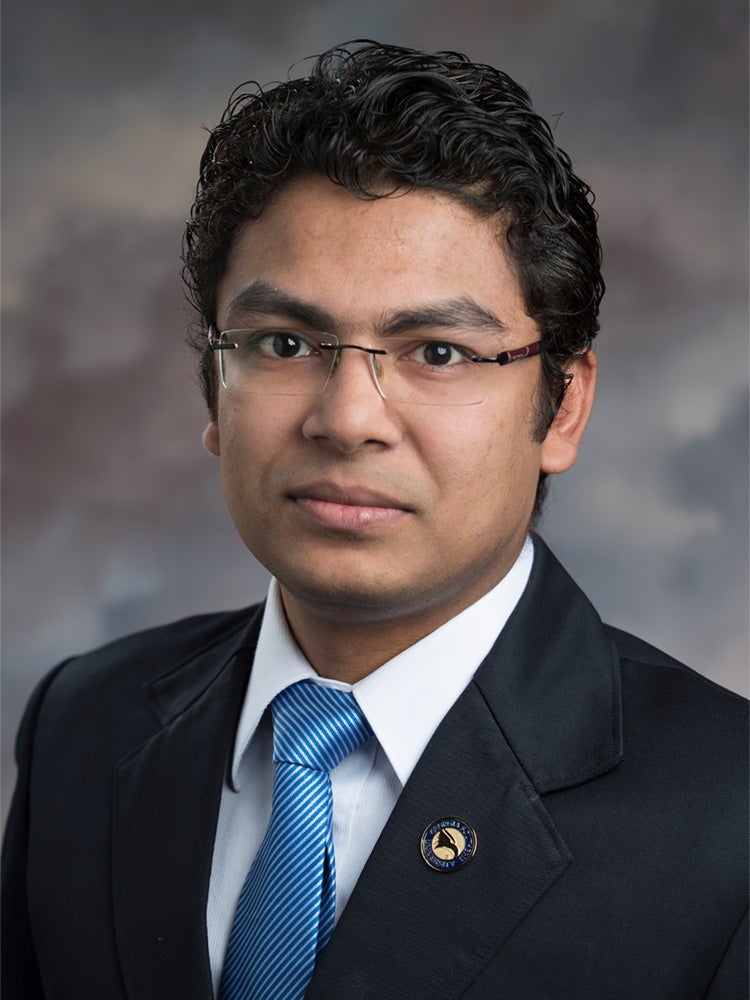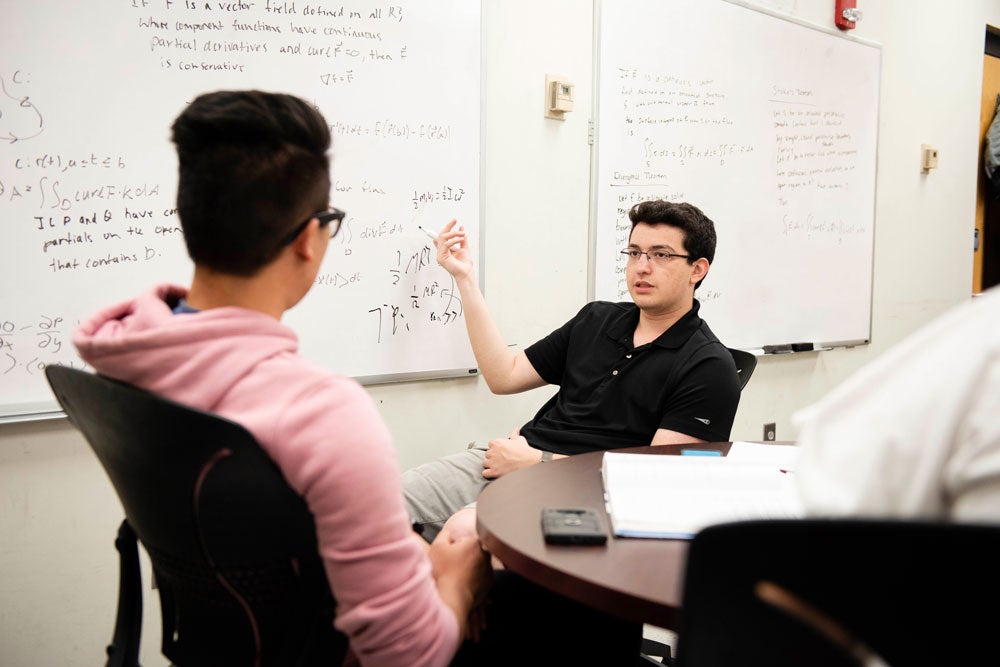As you master advanced analytical concepts and tools, prepare for in-demand roles in science, government and industry or lay the groundwork for success in Ph.D. programs.
Locations
- Statesboro Campus (In Person)
Why Earn a Master’s in Mathematics at Georgia Southern?
- Build the computational skills for some of today’s most in-demand jobs.
- Get individualized attention with a low student-to-faculty ratio.
- Pick your focus with a choice of two program concentrations.
- Engage in high-level research with active scholars to prepare for doctoral studies.
- 36 credit hours to completion.
Hone a sophisticated analytical toolkit with a Master of Science (M.S.) in Mathematics from Georgia Southern University. Reflecting today’s diversity of career paths, the flexible curriculum lets you focus your knowledge toward pure or applied mathematics and statistics, and you’ll craft a custom course load tailored to your goals.
Conducting original research shapes your studies here, no matter your intended outcome. You’ll work alongside faculty actively contributing to areas such as applied statistics, machine learning and mathematical biology. In the process, you’ll grow your quantitative, qualitative and analytical skills while getting greater exposure to the field’s latest developments and applications.
Building from here, you will write a culminating thesis that rigorously prepares you for doctoral studies. If you’re specializing in statistics, the unique Statistical Consulting Unit bridges theory with real-world professional experience.
Whether you strive to continue your education or launch an industry career, the program’s challenging and supportive environment supplies you with the tools to succeed.
Request More Information
What Can You Do With a Master’s in Mathematics?
In an increasingly data-driven world, demand for professionals with expertise in analytical tools is exploding. Your knowledge of advanced mathematics and the latest computational techniques positions you for two pathways. Develop models and identify actionable insights from complex data sets in finance, health care, technology or another sector. Or, you can pursue doctoral studies for research positions in government, academia or industry.
Where our graduates work:
- Education
- Finance
- Government
- Research
- Technology
What our graduates do:
- Biostatistician
- Data scientist
- Mathematician
- Operations research analyst
- Quantitative analyst
- Statistician
What You’ll Learn
The M.S. in Mathematics program provides ample room for customization so you can explore the topics that align with your aspirations.
Beginning from a foundation in advanced linear algebra, you’ll focus your studies through one of four concentrations: applied mathematics, computational science, pure mathematics or statistics. Each includes a small set of required courses and 21 additional credits for electives that you’ll select in consultation with your advisor.
Requiring you to apply all that you’ve learned, the program culminates in an independent research project and written thesis in which you’ll present your own results.
See the CurriculumConcentrations
From examining fundamental theory to applying the latest computational tools to technological challenges, our concentrations reflect mathematics’ vast possibilities and let you structure a curriculum in line with your interests.
Mathematics
Master and learn to deploy sophisticated analytical methods to address real-world challenges in science, engineering and other data-driven fields. Dive deep into theory, exploring the frontiers of mathematics’ known terrain as you train to move the discipline forward through new insights and applications.
Statistics and Data Science
Acquire the tools to collect, organize, analyze, interpret and present data, laying the groundwork to tackle challenges in science, business and more fields. Learn the skills for advanced modeling, simulation and other advanced mathematical and computational techniques.
Build Your Experience
As a master’s in mathematics student, you’ll have opportunities to engage in high-level research and lend your expertise to members of the surrounding community.

Research
Work alongside active faculty-scholars and contribute to research in domains ranging from pure mathematics to risk analysis, machine learning and other cutting-edge applications.

Thesis
Follow your curiosity by pursuing independent research under the guidance of a faculty mentor. In the process, you’ll build vital skills and prepare to present your findings in both written and oral forms.

Statistical Consulting Unit
Master’s students and professors provide statistical consulting services to professionals and researchers in the Statesboro area and beyond — an experience that sets our graduates apart in the job market.
Want to Learn More?
Explore essential information about our M.S. in Mathematics program, including application details, accreditation status, and licensing disclosures. Gain insight into the program’s credibility and requirements to help you start your journey toward success with the knowledge you need.
Applicants for the M.S. in Mathematics program must have:
- Completed requirements for the Bachelor’s degree in a mathematical, science, or engineering discipline at a college or university accredited by an appropriate institutional accreditor.
- An online application. (There is a $50 nonrefundable application fee.)
- A complete résumé.
- Two letters of recommendation from academia.
- Successfully completed courses in calculus, linear algebra, and probability, and ability of reading and writing proofs.
Application Deadlines
Students are admitted to begin in the fall, spring and summer terms. The application deadlines are as follows:
| Fall | Spring | Summer | |
|---|---|---|---|
| Priority Deadline | February 1 | September 1 | May 1 |
| Final Deadline | July 1 | November 15 | – |
Your application and all required documents must be received by the deadline.
Regular Admission
- Completed requirements for the Bachelor’s degree in a mathematical, science, or engineering discipline at a college or university accredited by an appropriate institutional accreditor.
- A complete résumé.
- Two letters of recommendation from academia.
- Successfully completed courses in calculus, linear algebra, and probability, and ability of reading and writing proofs.
Provisional Admission
Applicants who do not meet admission requirements may be admitted provisionally but must take appropriate undergraduate courses before receiving regular admission. Admission of an applicant who is deemed marginal may require that an interview be conducted by a committee of graduate faculty members from the department.
Non-Degree Admission
Non-degree students are accepted on an individual basis as space is available. Upon the advisor’s recommendation, up to a maximum of nine (9) credits earned as a non-degree student may be included in the program of study if a non-degree student is granted regular admission.
Contact Information
Dr. Yi Hu
Graduate Program Director
Department of Mathematical Sciences
Phone: 912-478-4729
yihu@georgiasouthern.edu
Graduate Assistantships are offered on a competitive basis. Typical duties include coordinating and assisting in our computer labs. Graduate assistants must be registered for a minimum of nine credit hours of graduate coursework, of which six hours must count toward their degree. If you’re interested, complete the Graduate Assistantship Application.
General questions about admission, graduate assistantships, and requests for application materials and catalogs should be directed to the College of Graduate Studies.
Alumni Feature
As a master’s student at Georgia Southern, Md Mahmud Hasan worked with Professor Wanduku to analyze competing strategies for vaccinating at-risk populations during an epidemic. He’s now earning his Ph.D. at Augusta University, where he continues to build his expertise in data analysis and modeling to empower data-driven decision-making for businesses and other organizations.
Explore Md's Thesis Research
Faculty Feature
Learn from professors pushing the field forward. Professor Jiehua Zhu is paving the way for more accurate patient diagnoses and treatments through new computational methods for computer image recognition and medical imaging.
Learn More About Professor Zhu
Take the Next Step
Build a rigorous foundation for future success in data-driven fields with a master’s in mathematics from Georgia Southern.
Contact Us
Department of Mathematical Sciences
Graduate Program Director
Dr. Yi Hu
Phone: 912-478-4729
yihu@georgiasouthern.edu




